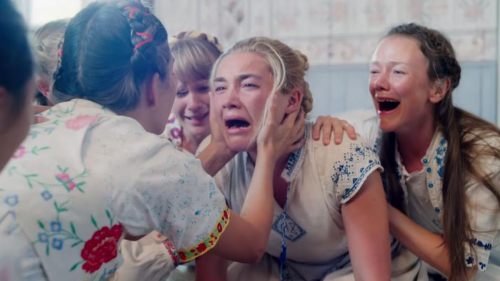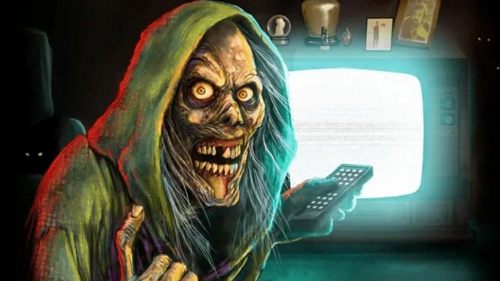What Is George A. Romero’s THE AMUSEMENT PARK Actually About?
Over the weekend, there was a minor hubbub on Horror Twitter about a "lost film" from Night of the Living Dead zombie maestro George A. Romero, one which had apparently been unearthed by author Daniel Kraus (who, it's worth noting, is also working on completing Romero's unfinished The Living Dead novel for a release next Fall). This revelation came on the heels of the director's widow, Suzanne Desrocher-Romero, announcing in early October that she was working on a plan to release a little-seen work that her late husband had filmed in '73.
For ardent fans of the Pittsburgh indie horror maverick, it wasn't tough to trace back through his timeline and figure out what Suzanne was referencing: The Amusement Park. In '73, Romero was working for The Latent Image - a company he co-founded in '62 in order to churn out commercial work* for a buck while brainstorming features - and was commissioned by a religious group to make a PSA/documentary regarding the abuse of American senior citizens. The entire endeavor was supposed to end with "Christian" suggestions on how the elderly could avoid becoming victims. Romero being Romero, the short turned out much more horrific than that (this is, after all, the same guy who filmed Mr. Rogers getting his tonsils removed in starkly dreamy detail).
Kraus' estimation of The Amusement Park was one of rabid enthusiasm, as evidenced by his string of Saturday night Tweets (one of which labels the "movie" a "savage masterwork"). Take a look:
I’m about to watch George A. Romero’s virtually unseen 1973 movie THE AMUSEMENT PARK (shot between Season of the Witch & The Crazies). Been trying to find this for 20 years. pic.twitter.com/ng6WqOeR6y
— Daniel Kraus (@DanielDKraus) November 10, 2018
OK, this movie is a REVELATION. pic.twitter.com/PaZA2HNDAW
— Daniel Kraus (@DanielDKraus) November 11, 2018
With the exception of NIGHT OF THE LIVING DEAD—maybe—THE AMUSEMENT PARK is Romero’s most overtly horrifying film. Hugely upsetting in form & function. pic.twitter.com/BmyS5iTIyU
— Daniel Kraus (@DanielDKraus) November 11, 2018
The scholar Tony Williams, who saw the film 30 years ago, wrote “The film is far too powerful for American society...It must remain under lock & key never seeing the light of day.”
— Daniel Kraus (@DanielDKraus) November 11, 2018
It was never shown publicly. The people who funded it wouldn’t allow it. And no wonder. It’s hellish. In Romero’s long career of criticizing American institutions, never was he so merciless. pic.twitter.com/987qbeb1J0
— Daniel Kraus (@DanielDKraus) November 11, 2018
Where can you see this savage masterwork? You can’t. But I’m dedicating myself to changing that. pic.twitter.com/nayHmSzeNq
— Daniel Kraus (@DanielDKraus) November 11, 2018
I mean, THE AMUSEMENT PARK doesn’t even show up on Romero’s @IMDb page! This thing is long-long-long-lost. What does that tell me? It’s dangerous & uncomfortable.
— Daniel Kraus (@DanielDKraus) November 11, 2018
Now, let's get a few things straight: The Amusement Park isn't technically a "movie", so those looking forward to something along the lines of a "new Romero feature" should adjust their expectations accordingly. This also explains why it doesn't show up on Romero's IMDb page, as most directors' industrial/commercial work (outside of music videos) don't tend to show up on their online resumes. This isn't a knock against Kraus, mind you; rather a rational explanation for that omission beyond The Amusement Park's "dangerous" and "uncomfortable" content.
What's most fascinating about Kraus' transmissions is the name-drop of film scholar Tony Williams, who'd written about The Amusement Park in the past. Williams' work (up until 2017) can be found at "Senses of Cinema", and he's a Professor and Area Head of Film Studies in the Department of English at Southern Illinois University, Carbondale. He's also written a book on the pictures of Larry Cohen (The Radical Allegories of an American Filmmaker) and two editions of a text on Romero. In the Second Edition of The Cinema of George Romero, he repurposes his previous analysis of The Amusement Park, which appeared in the only issue of Cinema Spectrum: The Film Magazine Of Fantasy & Imagination (Ed. Harry Nadler) ever published.
For the '80 Cinema Spectrum #1, Williams reviewed The Amusement Park from memory of a single viewing, and applied praise similar to Kraus':
"Although it lasts about 25 minutes, it is one of the most radical indictments of American callousness towards the vulnerable members of its society, and implicitly articulates the need for a social humanistic revolution within that society. What gives The Amusement Park its edge is its keen combination of fantasy and realism in an allegorical condemnation of selfish materialism."
This rebuke of "selfish materialism" would obviously be expanded upon in Romero's iconic zombie sequel, Dawn of the Dead. From the sounds of Williams' plot description, Romero was indulging his love for surrealist horror to such a point that it's sort of easy to understand why his religious backers wouldn't know what to do with the short upon its completion:
"The film begins with an optimistic old gentleman in a white suit encountering his mirror image in a white room. Where the latter differs is in his bruised, bleeding, despondent condition. A door leads to the outside. The dishevelled figure warns his spruce counterpart not to venture, outside, 'You won't like it out there'. The other man ignores his advice. He ventures out into the amusement park."
For those wondering, the old man is played by Lincoln Maazel, who would go on to portray Uncle Cuda in Romero's oft-unsung vampire wonder, Martin. Williams goes on to describe the anonymous geriatric's descent into Rockwellian Hell:
"This is America, the America of commercialism and entertainment, a place where the individual is valued for his purchasing power. The old gentleman purchases tickets for the various events beginning a journey into humiliation and despair. In the various sideshows he is either ripped off, economically, patronised, treated as an imbecile because of his age (his attempts to help an elderly couple whose dodgem car is attacked by an aggressive driver [Romero] ignored because he has forgotten his spectacles) robbed and assaulted by Hells Angels, misunderstood as a child molester when he attempts a kindly conversation with a little girl and violently assaulted by a young man."
Yikes. No wonder both Kraus and Williams have labeled it "unsettling". Imagine seeing this PSA on the tube when you were a kid. It's basically Threads for the elderly. You'd never be mean to grandpa again:
"The last incident occurs after a particular section of the film. A young couple go to a fortune teller to see what their life will be in an America half a century later. Both have aged, become useless members of society and live in slum conditions. The man has a heart attack and his wife attempts to phone a doctor. After problems of coins and unsympathetic telephone operators, she finally gets through to the doctor who is too busy pandering to his rich, pampered clients to come to their aid. The young man leaves the tent horrified at his fate in a future America. He sees the old man, representative of the age he will become in the future and vents his fear on him by a violent attack."
Williams also goes on to detail an exhibit in which Maazel's character is told he'll be "taken care of", only to be placed in a "funny farm" home for old folks. Even when the poor man tries to read a fantastical story to a little girl, he's cut off and mistreated by her parents, cast out as not even having the ability to be an acceptable "grandparent". He's rendered useless by society, and escapes back to the white room where he began, his final moments finding the beaten old man taking on the role of sooth-sayer:
"The wheel comes full circle. He encounters another spruce alter ego about to venture outside. He warns him, 'You won't like it out there', the camera dwelling on his despondent face"
If you're wondering how the rest of the runtime was padded out, apparently there's an epilogue where Maazel attempts an "encouraging salesman-like finale", but it's too late for any sort of chipper conclusion, following the stark horror Romero just unleashed on unsuspecting audiences. Williams implores that The Amusement Park "must never be released" as it's "too powerful for American society", a bit of tantalizing hyperbole that only guarantees anyone who reads it will want to see Romero's oatmeal-eating episode of Scared Straight that much more.
So, where can you watch The Amusement Park? According to Kraus, you can't. The film was never shown or aired by its religious backers, who claimed that it was "too difficult" and would confuse its audience. As of the publication of Cinema Spectrum #1, they still owned the rights and Romero's work remained unseen outside those who worked on it at Latent Image**.
But Desrocher-Romero and Kraus want to change all that! The George A. Romero Foundation is currently accepting donations to help restore The Amusement Park, which you can give to right here. If you're a fan of the "Latent Image Years" (which are chronicled on Arrow Video's superlative Between Night and Dawn Blu-ray set), this feels like an essential component to understanding who George A. Romero was during the years immediately following the film that changed modern horror forever. At the very least, you'll be helping to rescue a piece of work made by one of the most importent artists in the history of American cinema. "Lost" films some of the most fascinating in a director's oeuvre (just see Orson Welles' Other Side of the Wind for a great recent example), and from both Williams and Kraus' words, The Amusement Park finding an audience seems imperative.
*Iron City beer was one of their first big clients at the time.
**Though, again, this also isn't entirely true, as there were digital showings of the movie as recently as March at Brooklyn's Spectacle Theater.



